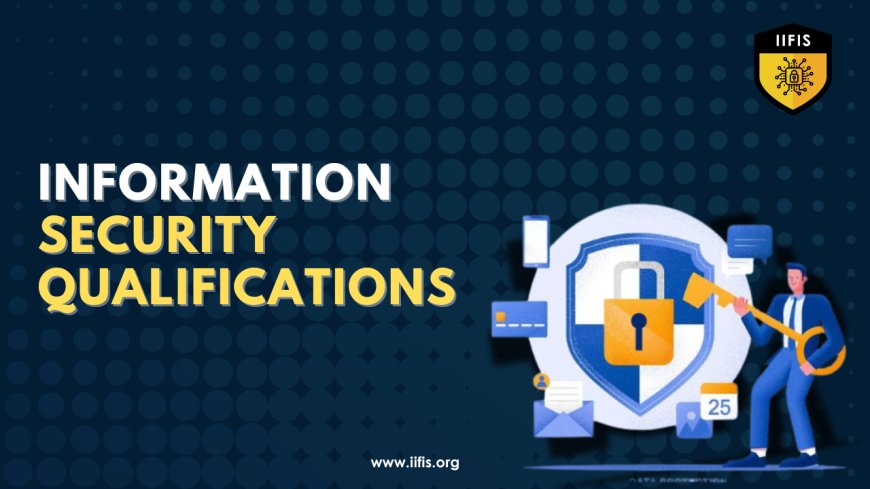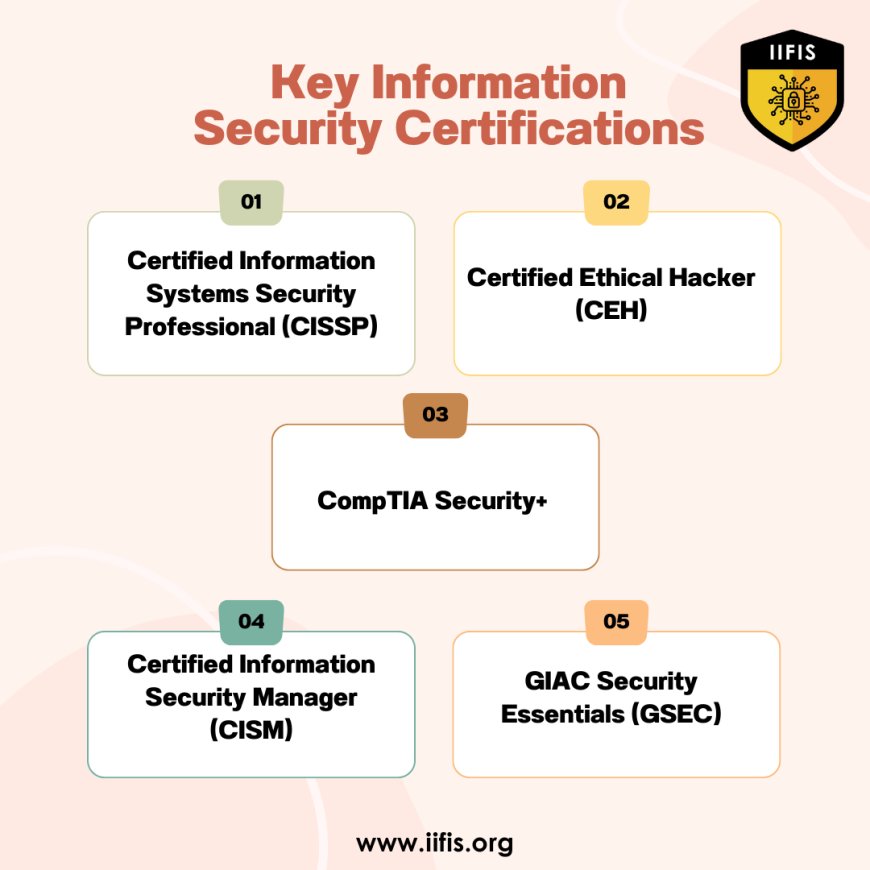Exploring the Value of Information Security Qualifications
Information Security qualifications are valuable for improving career opportunities, enhancing skills, and ensuring strong cybersecurity practices today.

In our digital world, information is very valuable. Businesses, governments, and people rely on digital systems to store and share data. Protecting this data from being accessed or changed by unauthorized people is critical. Information security helps keep data safe, making sure it stays private and accurate. This prevents problems like financial loss, damage to reputation, and legal issues.
As cyber threats increase, there is a rising need for skilled information security professionals. These experts create and manage security measures to protect data. Many organizations need people who can handle risks, deal with security incidents, and follow rules and regulations. This growing demand means there are many job opportunities for those interested in technology and security.
Importance of Information Security Qualifications
In today's digital world, protecting information is more important than ever. Information security qualifications are key to ensuring that professionals have the knowledge and skills needed to keep data safe. These qualifications provide a structured way to learn about the latest threats and how to counter them.
Why do information security qualifications matter?
1. Keeping Up with Change: The world of information security is always evolving. New threats pop up, and new tech comes along to tackle them. Qualifications ensure that experts stay in the loop, helping them safeguard data better.
2. Building Trust: When pros have the right qualifications, it breeds trust. Employers and clients feel secure knowing their data is in capable hands. Trust is key for good relationships and ensuring security protocols are followed.
3. Getting Better: Qualifications offer structured learning. From basics to advanced tactics, pros get a solid skill set. They learn to spot threats, set up defenses, and handle incidents effectively.
4. Opening Doors: Certifications can boost career prospects. Many employers seek candidates with specific qualifications, making certified pros stand out. It's a path to better job opportunities and climbing the career ladder.
5. Setting a Standard: Qualifications set a common benchmark for knowledge and skills. This helps ensure everyone in the field is on the same page. It also makes it easier for companies to gauge their staff's competence.
Key Information Security Qualifications
There are some of the key different types of Information Security Certifications which are required for essential qualifications are:-
-
Certified Information Systems Security Professional (CISSP)
The Certified Information Systems Security Professional (CISSP) is a certification for people who work in information security. It shows that you understand important security concepts and practices.
Benefits of Getting CISSP Certification
-
Recognition: CISSP certification can help you get noticed by employers. It shows you have a strong knowledge of information security.
-
Learning: Studying for the CISSP exam helps you learn about many important topics in information security. This can make you better at your job.
-
Job Opportunities: Many information security jobs prefer or require CISSP certification. Having this certification can help you find better job opportunities.
Eligibility Requirements and Exam Details
The CISSP certification is a valuable credential in information security, requiring either five years of work experience or four years with a degree or certain certifications. The exam covers eight main topics and consists of 100-150 multiple-choice questions, with a passing score of 700 out of 1000. Once certified, you must earn continuing education credits annually to stay updated. CISSP certification enhances recognition, deepens knowledge, and broadens job prospects in the field of information security.

2.Certified Ethical Hacker (CEH)
Certified Ethical Hacker (CEH) is a program that teaches people how to understand and use hacking techniques ethically. It trains individuals to identify weaknesses in computer systems and networks so they can prevent cyber attacks.
Benefits:
-
More job opportunities in the cybersecurity field: With this certification, you become more attractive to employers looking for professionals who can protect their systems.
-
Greater credibility and recognition: Being certified shows that you have the skills and knowledge to handle cybersecurity challenges effectively.
-
Helping protect organizations: By understanding hacking techniques, you can help companies strengthen their defenses against cyber threats.
-
Potential for higher salary and career growth: Certified ethical hackers are in demand and can command better salaries and career advancement opportunities.
Eligibility requirements and exam details:
-
Work experience: Candidates need at least two years of experience in information security or attend official training provided by EC-Council or accredited centers.
-
Exam format: The CEH exam consists of 125 multiple-choice questions.
-
Duration: The exam lasts for four hours, and candidates must achieve a passing score to earn certification.
-
CompTIA Security+
The CompTIA Security+ certification is a globally recognized standard for IT security professionals. It validates the foundational skills necessary to perform core security functions and pursue an IT security career. The certification covers essential principles for network security and risk management, making it an ideal starting point for cybersecurity careers.
Benefits of CompTIA Security+ Certification
-
Global Recognition: Widely accepted by companies worldwide, enhancing job prospects.
-
Foundational Skills: Establishes a core knowledge base in cybersecurity practices.
-
Career Advancement: Opens the door to more advanced roles and specialized security positions.
-
Higher Earning Potential: This can lead to better job offers and higher salaries.
-
Vendor-Neutral: Skills are applicable across technologies and vendors, increasing versatility.
Eligibility Requirements and Exam Details
To qualify for the CompTIA Security+ exam, there are no strict prerequisites, though it's recommended to have two years of experience in IT administration with a security focus. The exam itself features a mixture of multiple-choice and performance-based questions that test a candidate’s ability to identify and address security threats, attacks, and vulnerabilities in an IT environment.
-
Certified Information Security Manager (CISM)
The Certified Information Security is ideal for IT professionals who manage, design, and oversee an organization’s information security. Offered by ISACA, the certification focuses on aligning information security programs with broader business goals.
Benefits of CISM Certification
-
Recognition: Earning a CISM certification shows that you are serious about your career in information security management. It's respected around the world and helps validate your skills and knowledge.
-
Career Advancement: This certification can help you move up into higher management roles within IT security. It's often a requirement for senior positions in larger organizations.
-
Higher Salary: With a CISM certification, you're likely to see an increase in your earning potential. Companies are willing to pay more for professionals who bring proven skills to their security challenges.
-
Broad Knowledge: The CISM covers a range of topics, from risk management to security incident management, giving you a well-rounded view of information security management and how it fits into the bigger business picture.
Eligibility Requirements and Exam Details
To take the CISM exam, you need five years of experience in information security, including three years in management, within the last ten years. The exam has 150 multiple-choice questions focused on key aspects like security governance and risk management.
-
GIAC Security Essentials (GSEC)
The GIAC Security Essentials (GSEC) certification is aimed at IT professionals who want to show they understand information security beyond simple terminology and concepts. It's ideal for those working in roles such as security professionals, managers, and IT engineers, focusing on the practical aspects of securing IT systems and handling security tasks.
Benefits of GSEC Certification
-
Hands-on Skills: Teaches you security skills you can use at work right away.
-
Job Relevance: Holding a GSEC can make you a key part of any IT team by showing you have essential security skills.
-
Recognition: GSEC is a well-known certification around the world, showing your commitment and skill level in IT security.
-
Accessible: There are no prior requirements needed to take the GSEC exam, so it's open to both newcomers and experienced professionals.
-
Versatile Career Options: The certification is valuable for various IT roles, giving you more career choices.
Eligibility Requirements and Exam Details
Anyone can take the GSEC exam; there are no specific requirements to start. The exam covers a broad range of topics like network security, encryption, and access control. It includes 180 multiple-choice questions and has a 5-hour time limit. This exam tests your ability to apply security knowledge in real-world scenarios.
Impact of Information Reity Qualifications on Career Growth
Earning certifications in information security can significantly improve your career prospects by showing employers that you have the necessary skills and knowledge in this field. Many professionals have moved up to higher-paying and more responsible positions after getting certified. For example, someone might start as a network administrator, earn a security certification, and then move into a role as a security analyst or manager, overseeing a company’s information security strategy.
Getting certified in information security is important because it shows you have the skills needed to protect IT systems and helps improve your job prospects. These certifications are recognized worldwide and teach you useful skills for handling security issues. Information security is a field that keeps changing, so it’s important to keep learning and growing professionally. Continuing your education and gaining new certifications can help you stay current with new technologies and threats, and can lead to better job opportunities in the future.
























